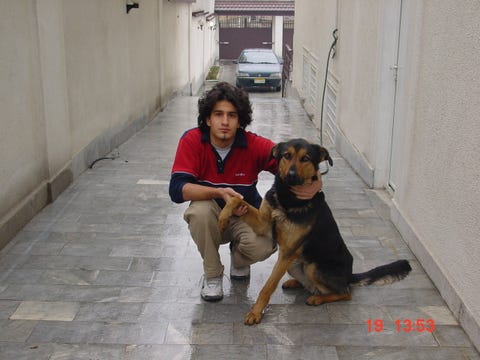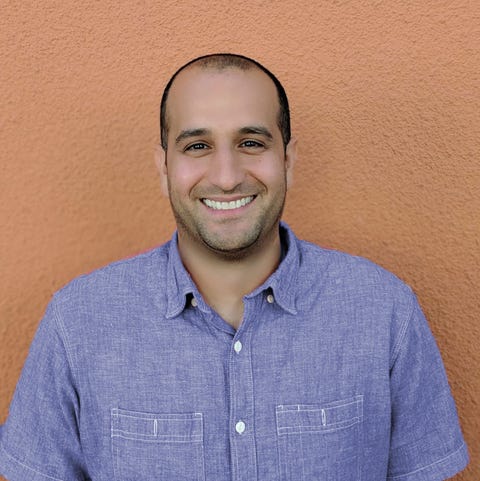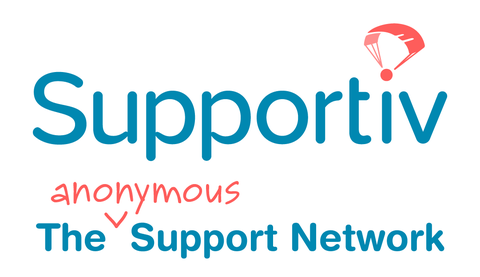May is Mental Health Awareness Month. It’s time to talk. Thirty-five percent of men are being treated for mental illness, but that number may be low because too many men don’t seek help. This is exactly why we’re spotlighting men who are getting guys to open up about mental health in provocative, engaging, and sometimes hilarious ways. Next up is Pouria Mojabi, who co-founded Supportiv to help people talk about their feelings. Here, Mojabi shares his own struggle, which ultimately helped fuel the creation of Supportiv. This interview has been edited and condensed for clarity.
I was born in Iran four years after a revolution that instilled a new set of values and ideologies in the country. As a result, the Iranian culture I learned from my parents was centered around “good thoughts, good words, and good deeds.” Often I felt like if my feeling was not “good,” I shouldn’t mention it.
“Men don’t show emotions.” “You are a man, you can’t be emotional.” “Don’t be high maintenance.” These were some of the things my dad used to say to me. This expectation of stoicism affected how I reacted to my own feelings and struggles.

Pouria Mojabi
I ended up thinking feelings were just masked weaknesses. And if I expressed what I was going through—say about a test I didn’t do great on—my dad would say, “If you had prepared well, you wouldn’t need to worry about anything” or ” always aced my exams by myself and my parents never had time for me.” So I ignored any feelings of stress or sadness I had.
“Pouria, something is wrong. You need help. You can’t function like this anymore.”
But stuffing down my feelings usually came back as intense anger towards random things. I remember when I was 23, my mom got into a biking accident and hurt her leg. My immediate reaction was to get mad at her. I was scared that she was hurt, but I wasn’t capable of expressing it.
Another example: When I was 27, working as a software engineer, one of my managers was poking fun at stereotypes, and it made me uncomfortable and upset. I forced myself to ignore it and get back to work.
That night, I didn’t sleep. For the next two days, I was filled with anger, but still found a way to ignore it and distract myself with work. On the fourth day, I woke up, looked in the mirror and I told myself: Pouria, something is wrong. You need help. You can’t function like this anymore.
My open-mindedness about mental health didn’t begin until I lost a friend to depression about five to six years later. I was 33, and it was really difficult to cope. There was a lot of overlap between my friend and I in terms of not processing emotions or expressing them, so his departure left me questioning if I would end up like him.
We’d been friends for six years after meeting at a mutual friend’s house in San Jose. I remember that he looked so happy on social media, always posting pictures of his girlfriend and his pet. It was impossible to guess that he was suffering. After he died, it hit me that emotional health was a bigger topic than most of us were willing to let on—that if we talked about it, things might be different.
“Witnessing the openness, understanding, and lack of judgment at those meetings really got to me.”
A week after my friend’s death, I researched available resources that could have helped him. I found Meetup.com and a simple anxiety/depression search connected me to a few groups that were meeting once in a while in the Bay Area, where I was living.

Pouria Mojabi
Witnessing the openness, understanding, and lack of judgment at those meetings really got to me. I’d never seen people express themselves so authentically, nor did I open up that way myself. I felt remarkably better after just my first meet-up, and over multiple events, I saw others make huge strides in their mental wellness, too. It really helped to see others dealing with difficult emotional struggles, and not trying to look perfect.
But even though those meetings were helpful, I saw two main obstacles: They were not available the moment people needed them, and for many people there was long a commute involved.
“Nobody knows your identity and you can talk to understanding people 24/7.”
For the next five to six months, I continued to explore the healthcare space for emotional and mental well-being resources. I was shocked by how little was available other than therapy. Of course therapy is an available option for some, but the stigma, cost, and intimidating process can make it difficult.
Two years after my friend’s passing, I was introduced to my now business partner, Helena Plater-Zyberk. We had a long conversation about what was missing in the mental health space, and by the end of the meeting we had thought out a new company, which became Supportiv.

Supportiv
Supportiv provides anonymous peer support chats and hyper-personalized resources. It uses a simple, non-stigmatizing question—”What’s your struggle?”—to connect users to others who want to talk about similar topics.
That might be the loss of a relationship, coping with anxiety, or bouncing back after messing something up. The company won SXSW’s pitch competition in 2019 for social and cultural impact, and in two years, we have passed 300,000 users with more than five million conversations on the platform.
The chats that occur have similar benefits to in-person support groups, but with important differences: Nobody knows your identity and you can talk to understanding people 24/7.
We decided on small group chats (seven people, max) to eliminate any biases or judgment that can occur over voice or video. And because anonymity can spawn trolls, we included professional moderators to facilitate positive peer-to-peer conversations.
And we’ve made it with little-to-no barriers to entry, so it’s more accessible to more people than traditional therapy. (Supportiv is free for 24 hours, then it costs 20 cents per minute.)
Supportiv also makes a point of making traditionally “feminine” mental health topics, like self-care, accessible to men (read our “Self Care Checklist For Manly Men”), which is important to us, since 57 percent of Supportiv users are men.
[Editors note: Pouria has offered Men’s Health readers the chance to try Supportiv for a month for free by entering the code MensHealth on the payment screen.]
Source: Read Full Article
